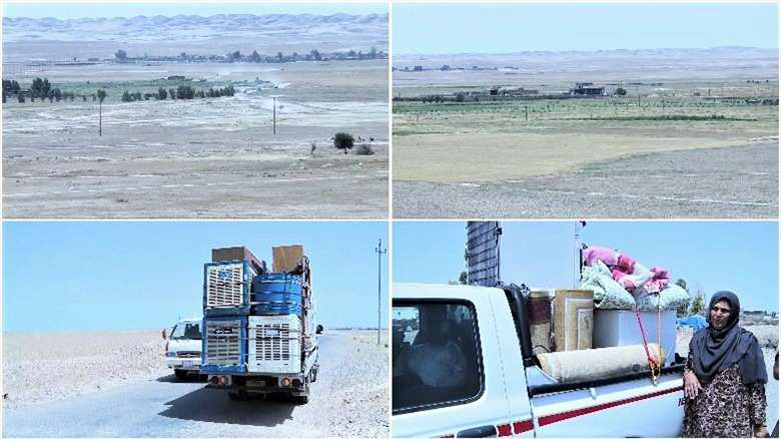Kurds in Diyala leave home as IS attacks on the rise

ERBIL (Kurdistan 24) – As attacks by Islamic State (IS) militiants continue to increase in some areas of Diyala Province, Kurdish residents are leaving home to seek safety and stability elsewhere.
These include families from the village of Glabat, in Jabara outside the embattled city of Khanaqin city, who have begun to flee in groups because of repeated attacks there lately.
On Thursday night, fighters thought to be members of the jihadist group killed one resident of the village and wounded another.
In 2014, Kurdish Peshmerga forces took responsibility for protecting disputed territories like Jabara, but were forced to withdraw on Oct. 16 of last year following their ouster by Iraqi troops and Iranian-backed Hashd al-Shaabi militias. The military campaign was Baghdad's response to the Kurdistan Region’s referendum on independence, held the month before.
“If the Kurdistan Regional Government (KRG) and the Peshmerga forces are not puy in charge of protecting the area, people will be obliged to leave their homes due to the threat of Da’esh (IS) attacks,” Fatih Siyamand, a Kurdish villager told Kurdistan 24 while leaving his village with his family on Friday.
“We have left many things behind at home… People who are leaving have livestock and farms,” Siyamand said.
Amina, a Kurdish woman from Glabat, was also leaving home with her belongings piled in the back of a pickup truck.
“Many thanks to Kurdish volunteers in the village who took up arms to protect us from Da’esh attacks in the past few days. They fought Da’esh for three hours. If it weren’t them, we would have all been killed and beheaded by Da’esh now,” Amina told Kurdistan 24.
“We left our home, livestock, and farming equipment. Since Oct. 16, there is no one to protect us, she added. "We want the KRG to do this, and for Peshmerga to return to our areas.”
Kurdistan 24 contacted Iraqi forces charged with providing security in the region, but they refused to comment on the topic.
The security situation has deteriorated considerably in the provinces of Kirkuk and Diyala following the October withdrawal of Peshmerga from the area. Though militarily defeated in Iraq, IS has continued to wage an insurgency with increased regularity in the region, with a rise in kidnappings, ambushes by gunmen, and various kinds of explosions.
“Iraqi forces cannot protect people in the area, especially at night. There is a security gap, which gave IS an opportunity to re-emerge,” Burhan Namiq, a Peshmerga officer, told Kurdistan 24.
Other parts of Iraq have also witnessed similar activity in recent months with the group claiming a string of bombings, assassinations, and kidnappings in areas previously liberated by Iraqi forces.
Despite announcing the group’s military defeat last December, Iraqi Prime Minister Haider al-Abadi has been forced to concede that the militants are still active in the country, many of them in sleeper cells and likely blending into the public.
Editing by John J. Catherine
(Harem Jaff contributed to this report)
